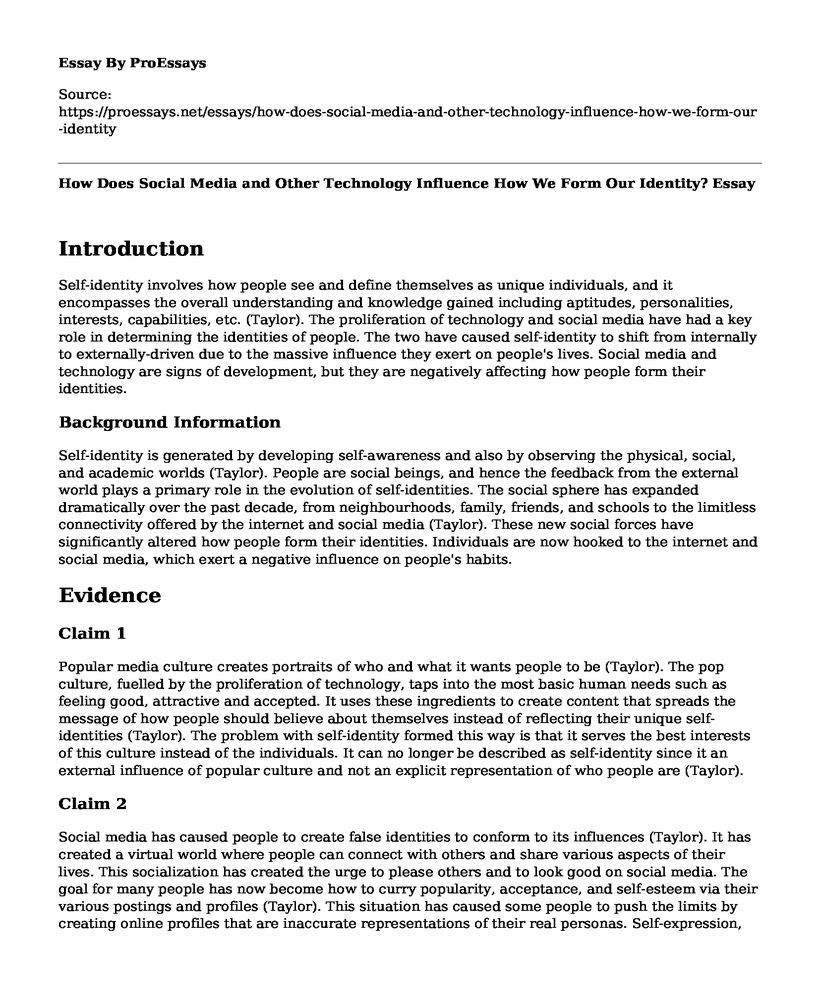Introduction
Self-identity involves how people see and define themselves as unique individuals, and it encompasses the overall understanding and knowledge gained including aptitudes, personalities, interests, capabilities, etc. (Taylor). The proliferation of technology and social media have had a key role in determining the identities of people. The two have caused self-identity to shift from internally to externally-driven due to the massive influence they exert on people's lives. Social media and technology are signs of development, but they are negatively affecting how people form their identities.
Background Information
Self-identity is generated by developing self-awareness and also by observing the physical, social, and academic worlds (Taylor). People are social beings, and hence the feedback from the external world plays a primary role in the evolution of self-identities. The social sphere has expanded dramatically over the past decade, from neighbourhoods, family, friends, and schools to the limitless connectivity offered by the internet and social media (Taylor). These new social forces have significantly altered how people form their identities. Individuals are now hooked to the internet and social media, which exert a negative influence on people's habits.
Evidence
Claim 1
Popular media culture creates portraits of who and what it wants people to be (Taylor). The pop culture, fuelled by the proliferation of technology, taps into the most basic human needs such as feeling good, attractive and accepted. It uses these ingredients to create content that spreads the message of how people should believe about themselves instead of reflecting their unique self-identities (Taylor). The problem with self-identity formed this way is that it serves the best interests of this culture instead of the individuals. It can no longer be described as self-identity since it an external influence of popular culture and not an explicit representation of who people are (Taylor).
Claim 2
Social media has caused people to create false identities to conform to its influences (Taylor). It has created a virtual world where people can connect with others and share various aspects of their lives. This socialization has created the urge to please others and to look good on social media. The goal for many people has now become how to curry popularity, acceptance, and self-esteem via their various postings and profiles (Taylor). This situation has caused some people to push the limits by creating online profiles that are inaccurate representations of their real personas. Self-expression, and hence identity, gives way to self-promotion and impression management (Taylor).
Opposing Side
View 1
Individuals can use popular media to develop their values by emulating role models (Caprez). Self-identity comes from observing the surrounding external environment. Movies, televisions, and video games can offer content that improves and shapes the identities of people in a positive manner. Technology has made the popular media content to be available to many people, and hence it could act as a tool to teach good morals(Caprez). Individuals, especially children, will emulate the positive values derived from the content, which will permeate their identities.
View 2
Social media can help in building and extending the personal and collective identities of teenagers (Treyvaud). During adolescence, teenagers experience newfound independence, and they tend to experiment with new identities. Social media offers a platform with complete freedom of self-discovery via trial and error. Shy people may feel safe seeking support on various issues, something that they would possibly not do in the real world. Individuals can form online relationships that are based on empathy and mutual trust, which can have a positive impact on their attitudes and identity (Treyvaud).
Conclusion
Popular and social media, spurred by technology, have affected how people form their identities by the undue influence they exert. People want to create false online profiles on social media to conform to a particular personality. The platform may offer the chance to form positive relations, but the more connected one gets, the higher the peer pressure levels, and hence the urge to fake identities. Popular media alters identities by airing what it wants people to become and believe about themselves. Educational or moral programs do not elicit the same entertainment value as this other content, and hence they are rarely aired. Therefore, the overall impact of technology and social media on identity formation is negative. It is an important issue since the proliferation of technology, and social media is worldwide, especially among children who are still learning who they are and forming their identities. Understanding the negative impacts on self-identity might help in formulating mitigation efforts.
Works cited
Caprez, Judy. Social Media Can Help Teens Develop Skills. Hays Daily News, 27 Dec. 2015, www.hdnews.net/article/20151227/LIFESTYLE/312279904. Accessed 15 June 2018.
Taylor, Jim. Technology: Is Technology Stealing Our (Self) Identities?. Psychology Today, July 27. 2011, www.psychologytoday.com/us/blog/the-power-prime/201107/technology-is-technology-stealing-our-self-identities. Accessed 15 June 2018.
Treyvaud, Robin. The Positive Effects Of Social Media On Teenagers. Wangle Family Insites, November 23. 2017, wanglefamilyinsites.com/advice/positive-effects-of-social-media-on-teenagers/. Accessed 15 June 2018.
Cite this page
How Does Social Media and Other Technology Influence How We Form Our Identity?. (2022, Jun 17). Retrieved from https://proessays.net/essays/how-does-social-media-and-other-technology-influence-how-we-form-our-identity
If you are the original author of this essay and no longer wish to have it published on the ProEssays website, please click below to request its removal:
- Essay on the 13th (2016) Documentary: Revelation of a High Number of Black Americans in Prison
- Effects of the Artificial Intelligence in the Financial Sector of the US Banks
- Theoretical Account of Oprah Winfrey's Personality
- Interpersonal Conflict in Big Bang Film Essay Example
- Movie Analysis Essay on "Mr. Polk's War"
- YouTube's Cultural Challenges: Monetization Policy Change Impact - Essay Sample
- Article Analysis Essay on Moped Enabled Mobile Phone Snatches







